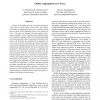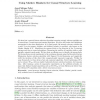113 search results - page 3 / 23 » Distributed Algorithms and Causally Consistent Observations |
115
Voted
IPPS
2007
IEEE
15 years 9 months ago
2007
IEEE
Consider a distributed network with nodes arranged in a tree, and each node having a local value. We consider the problem of aggregating values (e.g., summing values) from all nod...
123
Voted
JMLR
2008
15 years 2 months ago
2008
We show how a generic feature selection algorithm returning strongly relevant variables can be turned into a causal structure learning algorithm. We prove this under the Faithfuln...
123
click to vote
CDC
2009
IEEE
15 years 7 months ago
2009
IEEE
Abstract— Q-learning is a technique used to compute an optimal policy for a controlled Markov chain based on observations of the system controlled using a non-optimal policy. It ...
120
Voted
INFFUS
2010
15 years 1 months ago
2010
This paper introduces design principles for modular Bayesian fusion systems which can (i) cope with large quantities of heterogeneous information and (ii) can adapt to changing co...
93
Voted
ATAL
2005
Springer
15 years 8 months ago
2005
Springer
Multi-agent problem domains may require distributed algorithms for a variety of reasons: local sensors, limitations of communication, and availability of distributed computational...



